John Jellicoe (illustrator)
John Timothy Jellicoe (5 January 1842 – buried 13 June 1914) was a British illustrator who produced large number of illustrations for newspapers and magazines as well as illustrating books and stories by a wide range of authors.
John Timothy Jellicoe | |
|---|---|
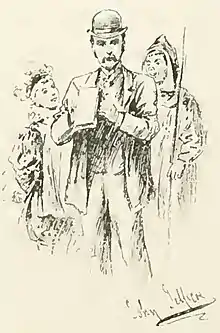 John Jellicoe at the Ripon millenary festival - probably a self-portrait | |
| Born | 5 January 1842 |
| Died | June 1914 (aged 72) Willesden, London, England |
| Nationality | English |
| Occupation | Illustrator |
| Years active | 1869 – 1912 |
| Known for | Illustrating sporting and dramatic events |
Notable work | The Record of the Ripon Millenary |
Early life
Jellicoe was born in London on 5 January 1842 to George Daniel Jellicoe (31 May 1799 – 8 December 1877), a solicitor's clerk and Ann Thomas (c. 1810 – October 1875).[1] The census returns show Jellicoe as the second child of his parents. Ann Thomas was his father's second wife, and Jellicoe had a half-sister Harriet Sophia Jellicoe (1828 – aft. March 1911)[note 1] and three half-brothers alive when he was born.[note 2] Jellicoe was baptised on 20 February 1842 in St Mary, Islington, London.[1]
Marriages and family
Jellicoe married Georgina Annie Wiltshire (12 December 1841 – 18 October 1872), at Millbrook, Hampshire on 23 May 1868.[2][3] The couple had one son, George Edward Jellicoe (c. 1872 – aft. 1924) who became a publisher.[note 3][4]
At the time of the 1871 Census, Jellicoe was living at 1 Brook Road, Stoke Newington, London, where his son, George Edward, was born. Georgina died on 18 October 1872.[5] Jellicoe remarried three years later to Charlotte Anne Holland (1845 – October–November 1913). They had two children Mabel (1877 – 1945) and Gordon (1885 – 1941).
The 1881 census found Jellicoe living at 2 Grosvenor Park Villas with his wife and two children. His occupation had changed from artist in wood to artist (figures). By 1891 Jellicoe was living at 74 Parkhill Road, Hampstead, where he would remain until 1907 at least. By the 1911 census he was staying at Gondar House, Gondar Gardens in Hampstead. By 1913 he was living at 5 Park Avenue, north of Hampstead.
Works
John studied art in London and began exhibiting in 1865. He exhibited pen and ink drawings, paintings, and watercolours at the Society of British Artists and the Royal Academy.[note 4][6] Jellicoe was regarded as an exceptionally fine figure artist and often collaborated with other illustrators by drawing figures into their illustrations of buildings and places.[7]
Periodical Illustrations
Jellicoe was an illustrator for the Illustrated Sporting and Dramatic News as well as illustrating for other periodicals including the Illustrated London News, St. Paul's Magazine,[note 5][8] The Windsor Magazine,[9] and the boys' papers Union Jack and The Boy's Own Paper.[10]
Illustrations of the Ripon Millenary Festival
Jellicoe attended the Ripon Millenary Festival, held in Ripon, North Yorkshire, in 1886. This was one of the pageants of the late Victorian vogue for Merrie England.[11]
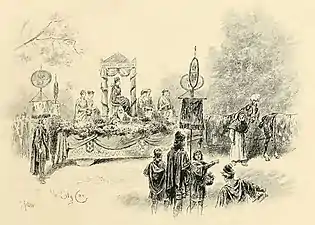 Ye City Car
Ye City Car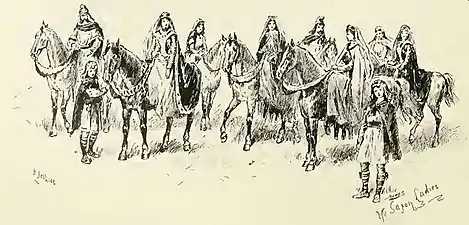 Ye Saxon Ladies
Ye Saxon Ladies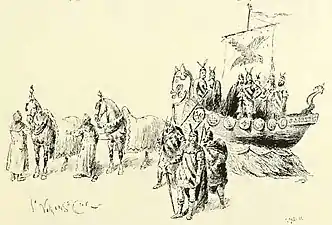 Ye Viking Cart
Ye Viking Cart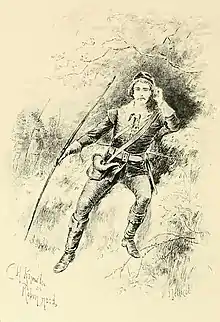 Robin Hood
Robin Hood_at_the_Ripon_Festival.jpg.webp) Charles I
Charles I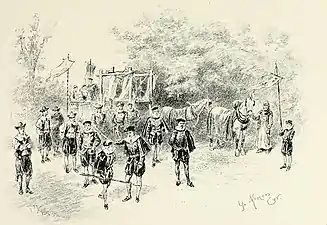 Ye Mercers Car
Ye Mercers Car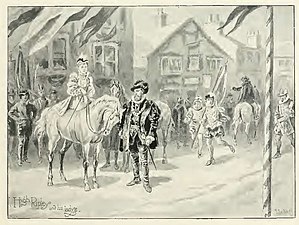 Hugh Ripley and his Ladye
Hugh Ripley and his Ladye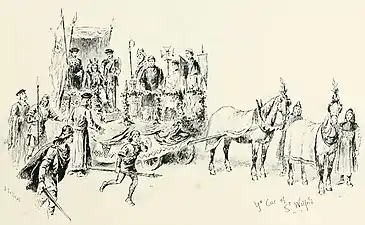 St Winfred
St Winfred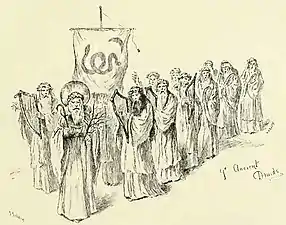 Ye ancient druids
Ye ancient druids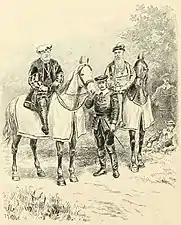 The first two Members of Parliament for Ripon
The first two Members of Parliament for Ripon
Book illustrations
Jellicoe illustrated books and stories by the following authors (source of the attribution is cited for each author):
- Rev. Alfred Allen Brockington (1872 – 1938), a schoolmaster, Anglican cleric, poet, and writer on religious topics, mysticism, and school stories.[12][13][14]
- Charlotte Brontë (1816 – 1855), a poet and novelist and the eldest of the three Brontë Sisters.[15]
- Robert Browning (1812 – 1899), the poet and playwright.[16]
- William Boyd Carpenter (1841 – 1918), Bishop of Ripon at the time of the Millenary Festival.[16]
- Alfred John Church (1829 – 1912), a classical scholar who wrote books on the Romans and Greeks, as well as other historical topics.[17]
- Mrs. Henry Clarke (1853 – 1908), who wrote historical fiction and children's books.[16]
- Harry Collingwood (1843 – 1922), a writer of boys' adventure fiction, usually in a nautical setting.[18] who wrote boys' adventure fiction, usually in a nautical setting.
- Charles Dickens (1812 – 1870), for whom Jellicoe illustrated posthumous reissues.[19]
- John Finnemore (1863 – 1915), who wrote books and stories for younger readers, as well as school textbooks.[17]
- Oliver Goldsmith (1728 – 1774), the Irish poet and playwright.[19]
- M. Y. Halidom (1838 – 1914), a pseudonym of Alexander Huth, a writer of supernatural stories who also wrote under the pseudonym Dryasdust.[20][17]
- W. Harrison (1847 – c. 1895), the printer in Ripon responsible for collating the Record of the Ripon Millenary Festival.[19]
- Bernard Heldmann (1857 – 1915), a prolific author who published 76 novels and hundreds of short stories.[21][22]
- Mrs. R. E. Henry, primarily a playwright, but also wrote Fairy tales.[14]
- G. A. Henty (1832 – 1902), a prolific writer of boy's adventure fiction, often set in a historical context, who had himself served in the military and been a war correspondent.[15]
- Dr. Johnson (1709 – 1784), the famous diarist.[19]
- Andrew Lang (1844 – 1912), the prolific Scottish author interested in folk and fairy tales.[17]
- Mary Cornwall Legh (1857 – 1941), a British Anglican missionary.[14]
- Emma Leslie (1838 – 1909), Emma Boultwood, wrote more than 100 books, mostly juvenile and historical titles with a Christian message.[23][16]
- Winifred Mary Letts (1882 – 1972), an English-born writer who spent most of her life in Ireland, writing plays, novels, and children's fiction.[14]
- John Leyland (c . 1858 – 1924), who wrote guidebooks and books on nautical themes.[16]
- Charles Rathbone Low (1837 – 1918), an Irishman who served in the Royal Indian Navy and wrote historical works and adventure fiction.[24][25]
- Anne Manning (1807 – 1879), who wrote both fiction and non-fiction.[19]
- Bessie Marchant (1862 – 1941), who wrote adventure fiction featuring young female heroines.[16]
- H. R. McEniry, who wrote Twelve Parables of Our Lord, Illustrated and Illuminated.[19]
- A. F. Mockler-Ferryman (1856 – 1930), a British Army officer who wrote about geography, history, and the military.[26][16]
- Frank Frankfort Moore (1855 – 1931), an Irish journalist, playwright, novelist, poet, and biographer.[17]
- James Macdonald Oxley (1855 – 1907), a Canadian writer of juvenile fiction.[27]
- Charles Eyre Pascoe (1842 – 1912), who wrote on the stage, travelogues, guides to schools, souvenirs and other works.[28][19]
- Eliza Caroline Phillips (1847 – 1923), who wrote illustrated books for small children.[29][19]
- Charles Pond (1856 – 1931), comedian who wrote the sketch The Fully Licensed Man, which was recited over 11,000 times.[30][19]
- Robert Richardson (1850 – 1901), an Australian poet, writer, and journalist who wrote novels for children, stories for boy's papers, and books about travel.[18]
- Charles Napier Robinson (1849 – 1938), a Royal Naval officer who on retirement, became a journalist on naval matters and published the journal The Navy and Army Illustrated : a magazine descriptive and illustrative of everyday life in the defensive service of the British Empire..[16]
- Thomas Roscoe (1791 – 1871), and English author and translator.[19]
- Richmond Seeley (1833 – 1913), a London publisher who worked with his cousin Alfred John Church to produce illustrated versions of stories from the classics.[31][17]
- John Walter Sherer (1823 – 1911), a novelist and a member of the Bengal Civil Service at the time of the Indian Mutiny.[32][33][14]
- Grace Stebbing (1840 – 1936), a prolific author of moral tales for boys and girls as well as historical romances and biographies. She wrote her first book aged 7 and her last one at 91, with 89 books in total as well as numerous short stories.[34][35][36]
- Clement Strong, who wrote stories for boys papers.[37]
- Robert Smith Surtees (1805 – 1864), an editor, novelist and sporting writer.[16]
- Lord Tennyson (1809 – 1892), the Poet Laureate of the United Kingdom during much of Queen Victoria's reign.[16]
- Lily Watson (1849 – 1932), an English Baptist who wrote novels and instructional works.[38][14]
- Mrs. Henry Wood (1814 – 1887), an English novelist who turned to writing to support her family when her husband's business failed, and whose work was widely read in the United States and Australia.[17]
Example of book illustration
While most of Jellicoe's illustrations were line drawings, he did a number of illustrations in colour. The Story of Joan of Arc (1906) was a children's book written by Andrew Lang (31 March 1844 – 20 July 1912). The book was published in by T. C. and E. C. Jack in London and Edinburgh. Jellicoe produced eight colour illustrations for the book, one of which (the wounding in battle) was used as a book cover.
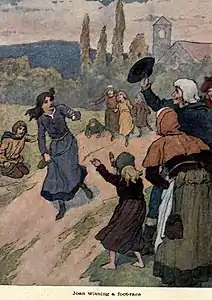 Joan winning a foot race
Joan winning a foot race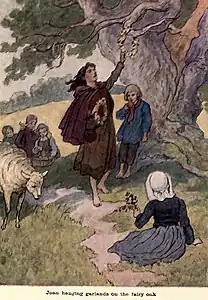 Joan of Arc hanging a garland on a fairy oak
Joan of Arc hanging a garland on a fairy oak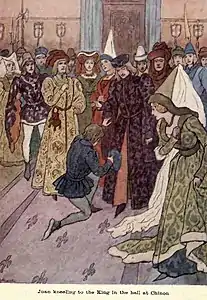 Joan kneeling to the King of France
Joan kneeling to the King of France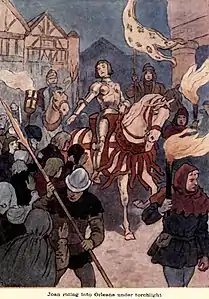 Joan of Arc riding into Orleans by torchlight
Joan of Arc riding into Orleans by torchlight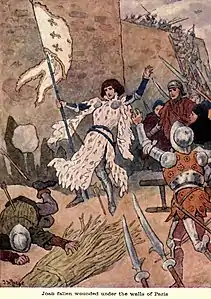 Joan of Arc wounded in battle
Joan of Arc wounded in battle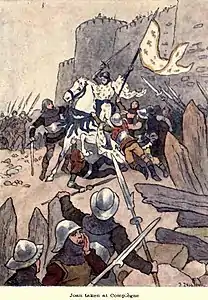 Joan of Arc taken prisoner
Joan of Arc taken prisoner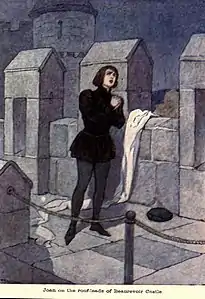 Joan of Arc praying for guidance
Joan of Arc praying for guidance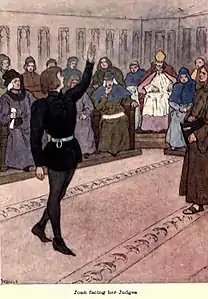 Joan of Arc on trial for witchcraft
Joan of Arc on trial for witchcraft
Death
Charlotte died in Willesden in October or November 1913,[39] and Jellicoe followed in June 1914.[40] He was buried on 13 June 1914[41] in the same plot in Hampstead Cemetery where Charlotte had been buried on 4 November.[42]
Notes
- His half-sister Jellicoe was living with him in 1911, and was described as half-witted on the census form. She was 82 at the time.
- another two half-brothers had dies in infancy.
- Sir Geoffrey Allan Jellicoe (8 October 1900 – 17 July 1996), the famous Landscape architect was George Edward's son
- It is not clear if the Royal Academy, which had originally refused to exhibit Watercolours had changed its policy by this time.
- The publisher James Virtue set up St Paul's Magazine to rival Cornhill and copied the format, frequency and price. Virtue originally hope the call it Anthony Trollope's Magazine.
References
- Ancestry.com (2010). "London Metropolitan Archives; London, England; Reference Number: p83/mry1/1177". London, England, Church of England Births and Baptisms, 1813-1917. Provo, Utah: Ancestry.com.
- "Index entry". FreeBMD. ONS. Retrieved 23 March 2020.
- "Marriages". Berkshire Chronicle (Saturday 30 May 1868): 8. 1868-05-30.
- Moggridge, Hal (2005-05-26). "Jellicoe, Sir Geoffrey Alan". Oxford Dictionary of National Biography. Archived from the original on 2019-12-06. Retrieved 2020-03-26.
- "Index entry". FreeBMD. ONS. Retrieved 26 March 2020.
- Beatrice (2018). "The History of Watercolours". Mall Galleries. Archived from the original on 2020-03-25. Retrieved 2020-03-25.
- MacAlister, J. Y. W., ed. (1902). "English Book Illustration of To-Day: By R. E. D. Sketchley". The Library: A Quarterly Review of Bibliography and Library Lore: New Series. London: Kegan Paul, Trench, Trubner And Co., Ltd. (3): 192. Retrieved 2020-03-25.
- Sutherland, John (1989). "St Paul's Magazine". The Stanford Companion to Victorian Fiction. Stanford, California: Stanford University Press. p. 550.
- "Sketches at Boscombe, Bournemouth". Art of the Print. Archived from the original on 2005-12-30. Retrieved 2020-03-23.
- Holland, Steve. "Artists: Jellicoe, John". British Juvenile Story Papers and Pocket Libraries Index. Archived from the original on 2020-02-06. Retrieved 2020-03-25.
- Marios Costambeys; Andrew J. Hamer; Martin Heale (2007). The Making of the Middle Ages: Liverpool Essays. Liverpool University Press. pp. 5–. ISBN 978-1-84631-068-3.
- A. & C. Black Ltd. (1967). "Brockington, Rev. Alfred Allen". Who Was Who: Volume III 1929-1940: A Companion to Who's Who Containing the Biographies of Those Who Died Diring the Period 1929-1940. III (4th ed.). London: Adam and Charles Black. p. 165. Retrieved 2020-05-04.
- Francesca Bugliani Knox; John Took (3 March 2016). Poetry and Prayer: The Power of the Word II. Taylor & Francis. pp. 17–18. ISBN 978-1-317-07938-5. Retrieved 25 March 2020.
- "Search". Library Hub Discover. Retrieved 2020-03-24.
- "Search". Internet Archive. Retrieved 2020-03-24.
- "Search". AbeBooks.co.uk. Archived from the original on 2020-03-25. Retrieved 2020-03-24.
- "Books by Jellicoe, John". Project Gutenberg. Archived from the original on 2020-03-25. Retrieved 2020-03-24.
- "Advertisement for Old England's Flag, the Christmas Number of The Union Jack". Fishing Gazette (Saturday 04 November 1882): 15. 1882-11-04.
- "Main Catalogue". Explore the British Library. 1882-11-04.
- Clute, John (2018-08-31). "Halidom, M Y". The Encyclopedia of Science Fiction. Archived from the original on 2019-04-20. Retrieved 2020-05-04.
- Vuohelainen, Minna. "Bernard Heldmann and the Union Jack, 1880-83: The making of a professional author" (PDF). Victorian Periodicals Review. 47 (1): 106. Archived (PDF) from the original on 2020-03-26. Retrieved 2020-03-22.
- Holland, Steve. "Contents Lists". British Juvenile Story Papers and Pocket Libraries Index. Archived from the original on 2020-02-06. Retrieved 2020-03-26.
- "Author: Emma Leslie (1838–1909) (real name Emma Boultwood)". At the Circulating Library: A database of Victorian Fiction 1837-1901. 2019-12-31. Retrieved 2020-05-05.
- Kirk, John Foster (1908). "Low, Charles Rathbone". A Supplement To Allibone S Critical Dictionary Of English Literature British And American Authors. II. Philadelphia: J. B. Lippincott Company. pp. 1020–1021.
- Holland, Steve. "Contents Lists". British Juvenile Story Papers and Pocket Libraries Index. Archived from the original on 2020-02-06. Retrieved 2020-03-26.
- "Death of Noted Old Cheltonian: Col. Mockler-Ferryman, Regimental Historian". Cheltenham Chronicle (Saturday 31 May 1930): 3. 1930-05-31.
- Holland, Steve. "Contents Lists". British Juvenile Story Papers and Pocket Libraries Index. Archived from the original on 2016-03-17. Retrieved 2020-03-26.
- "Death of Mr. Charles Eyre Pascoe". Westminster Gazette (Tuesday 12 November 1912): 14. 1912-11-12.
- "Death of a Children's Authoress". Gloucester Citizen (Saturday 17 November 1923): 6. 1923-11-17.
- "Chas. Pond's Highly Romantic Life Ended: London: Oct 17". Variety (Tuesday November 3, 1931): 63. 1931-11-03. Retrieved 2020-03-25.
- "Death of Mr. R. Seeley". West Surrey Times (Friday 17 January 1913): 7. 1913-01-17.
- A. & C. Black Ltd. (1967). "Sherer, John Walter". Who Was Who: Volume I: 1897-1915: A Companion to Who's Who Containing the Biographies of Those Who Died During the Period 1897-1915. London: Adam and Charles Black. p. 645. Retrieved 2020-05-05.
- "Mr. J. W. Sherer". The Times (Monday 01 January 1912): 11. 1912-01-01.
- "Fashionable and Personal". Sevenoaks Chronicle and Kentish Advertiser (Friday 28 February 1936): 10. 1936-02-28.
- "Wills and Estates". The Scotsman (Thursday 21 May 1936): 13. 1936-05-21.
- Holland, Steve. "Contents Lists". British Juvenile Story Papers and Pocket Libraries Index. Archived from the original on 2020-02-06. Retrieved 2020-03-26.
- Holland, Steve. "Contents Lists". British Juvenile Story Papers and Pocket Libraries Index. Archived from the original on 2020-02-06. Retrieved 2020-03-26.
- "Author: Lily Watson (1849–1932) (pseudonym for Martha Louisa Watson nee Green)". At the Circulating Library: A database of Victorian Fiction 1837-1901. 2019-12-31. Archived from the original on 2016-03-24. Retrieved 2020-05-05.
- "Index entry". FreeBMD. ONS. Retrieved 23 March 2020.
- "Index entry". FreeBMD. ONS. Retrieved 23 March 2020.
- "Burial Registry Summary: Jellicoe: John Timothy; 13 June 1914". Deceased online. Retrieved 2020-03-26.
- "Burial Registry Summary: Jellicoe: Charlotte Anne: 04 November 1913". Deceased online. Retrieved 2020-03-26.
External links
Note that some links will include works by Admiral John Rushwood Jellicoe, and not just by John Jellicoe.
- Works by John Jellicoe at Project Gutenberg
- books by John Jellicoe at the British Library
- Books by John Jellicoe at Library Hub Discover (included works by and about Admiral John Jellicoe also).
- Books by John Jellicoe at the Internet Archive (includes works by Admiral John Jellicoe also).
- Digital editions of books illustrated by John Jellicoe in the Osborne Collection of Early Children's Books at the Toronto Public Library.